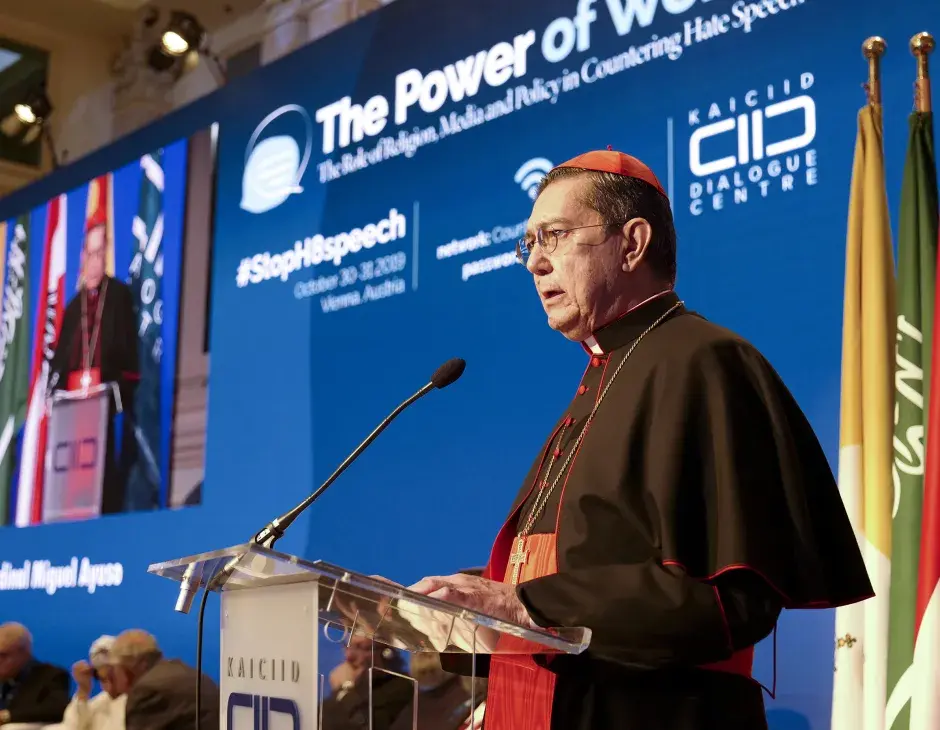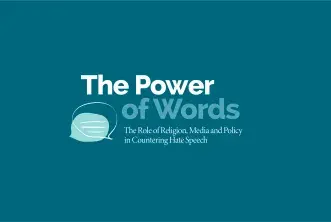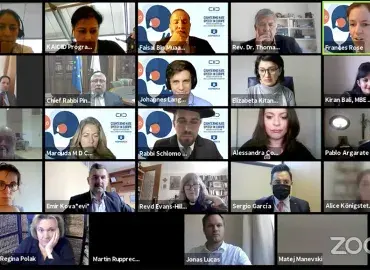Over two days in Vienna last week, nearly 200 prominent religious leaders, theologians, diplomats and representatives from IGOs and NGOs from around the world gathered to share ideas and discuss how to tackle hate speech using new policies and dialogue.
Hosted by The International Dialogue Centre (KAICIID), the inaugural conference, “The Power of Words: The Role of Religion, Media, and Policy in Countering Hate Speech”, called on expert research and personal testimony given by delegates from dozens of countries, including the United States, Lebanon, Iraq, Egypt, Bahrain, Saudi Arabia, Jordan, the Netherlands and the UK.
Distinguished religious and political leaders who spoke and participated in panel discussions at the Grand Hotel, Vienna included the former president of the Republic of Austria, Heinz Fischer, Ján Figel, Special Envoy for the promotion of freedom of religion or belief outside the European Union, Cardinal Miguel Ayuso Guixot, President of the Pontifical Council for Interreligious Dialogue and Sheikh Dr. Shawki Ibrahim Allam, Grand Mufti of Egypt.
The conference, which was followed online under the hashtag #stopH8speech, focused mainly on testimony and insights from the Arab region, including those from Christian, Druze, Jewish, Muslim and Yazidi communities. Hate speech has long been regarded as an accelerant for discord and hostility in parts of the Arab region and further afield and “The Power of Words” conference was a response to the United Nations’ Plan of Action on Hate Speech, unveiled earlier this year.
Speaking on the opening day of the conference, the former president of Austria Heinz Fischer talked about the disastrous consequences of hate speech on societies around the world. “Social media are almost the invitation for hard and aggressive language,” he said. “They are partly anonymous and it is proved that in the social media the aggression of the language is growing, and the language and the sentence and the hate speech can have disastrous consequences in certain circumstances. And so it is not only my opinion, but the opinion in general and the opinion of the European Commission and the opinion of the Secretary General of the United Nations that hate speech is a danger, is a problem.”
In another powerful address, Adama Dieng, the United Nations Secretary General’s Special Advisor for the Prevention of Genocide, spoke movingly of how hate speech targets universal human values. “We have to bear in mind that hate speech is an attack on diversity,” he said. “It is an attack on tolerance, it is an attack on peace, it is an attack on the principles and values which are the backbone of the United Nations charter. And the same values we find in each and every religion.”
Other prominent religious leaders who attended the conference included Elizabeta Kitanovic, Executive Secretary, The Conference of European Churches, Sultan Saad Qahtani, Editor-in-Chief of the Riyadh Post and Abdullah Al-Fawzan, Vice Chairman and Secretary General of King Abdul Aziz Centre for National Dialogue.
During discussion panels which examined how religious leaders could counter hate speech and what role the media could play in preventing the spread of intolerance, participants drew on their experience of working in countries such as Tunisia, Italy, Morocco, Egypt and Saudi Arabia and of coming under attack on social media. “Hate speech generates vindictiveness, anger, revenge,” said Ahmed Abbadi, Secretary General of the Mohammedia League of Moroccan Ulama. “It generates fear from the other and others in general. It weaponises everything around, even religion.”
As in other regions around the world, the number of hate crimes reported in countries in Europe is on the rise. Hate crimes reported to police in the UK for instance has more than doubled since 2013, according to new official figures. Most hate crime offences recorded by police forces in England and Wales were racial. The rise can be partly attributed to improvements in how crime is recorded, but part of the increase over the last year could reflect “a real rise” in hate crimes, according to the Home Office.
At “The Power of Words” conference, attendees spoke of the importance of understanding the rights of victims. “I would really stress the needs of victims, we really need to put a perspective of individuals into this debate because hate speech may be extremely harmful,” said Klára Kalibová, a lawyer, hate speech analyst and a member of the International Network of Hate Studies. “It is proven already by various researchers that hate crime victims develop post-traumatic stress disorder more often than people who suffer normal crimes. So hate speech is a crime under certain circumstances when it defames nations, when it defames religion, when it defames ethnic groups. It’s also a crime when it incites to violence against an individual or a group of people.”
While the average age of Twitter and Facebook users is rising, newer social media platforms like TikTok have attracted younger age groups. Alessandra Coppola, who runs a Council of Europe campaign called No Hate Speech, spoke of both the opportunities offered by digital platforms, as well as the importance of using them in a responsible way.
“New media gave all of us a chance to have a voice, to equally participate in society,” she said. “Each one of us can be a producer, can be an author, can be a writer and this is a very important opportunity. But this can also be a very nightmarish weapon. If we use this not for creating bridges, not for creating dialogue, but for creating wars in another way, online.”
Over several workshops and debates, speakers reiterated universal themes of tolerance and education. “We here as representatives of our religious traditions, we have duties of our own. These are to teach our children not to use the language of stereotypes, not to use the language of prejudice and bigotry,” said Chief Rabbi David Rosen of the American Jewish Committee and a Board Member of KAICIID
The conference ended with KAICIID announcing 1.5 million Euros in funding across the Centre’s global programs in 2020 to counter the growth of hate speech.
--
“The words of a human being have tremendous power, to build and destroy, to give life and to take life. In Abrahamic religions…
Religion brings people together. As health officials around the world discourage unnecessary contact that may lead to COVID-19…




